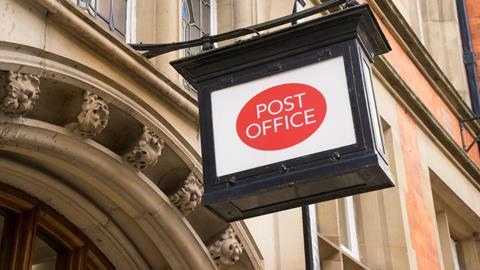Follow our live blog from the public inquiry into the Post Office Horizon scandal
4.10pm: And that is that for today. Blake says he has a few more issues to go through with Crichton and suggests to chair Sir Wyn Williams that there might be time to pick it up tomorrow. Williams responds: 'If you are trying persuade me after a long hard day that we should stop now, then you needn't say any more.'
We'll be back in the morning.
4pm: The relationship between Vennells and Crichton had appeared to have broken down by September 2013. The pair met at a Costa near the Post Office offices in Old Street where Vennells recorded that Crichton got angry and shouted at her. Crichton says she has no recollection of this.
Vennells said Crichton was upset that the Post Office had ruined her reputation and compromised her by undertaking a further review of the Second Sight handling. Crichton was said to be ‘very emotional’ and her ‘ego and self-esteem have been undermined’.
Then comes a particularly enlightening note from Vennells. The chief executive reflected that ‘Susan was possibly more loyal to her professional conduct requirements and put her integrity as a lawyer above the interests of the business’.
Crichton tells the inquiry that at all times she had been focused on delivering an independent report through Second Sight.
‘If that meant I put my integrity as a lawyer above the interests of the business then that is what I did,’ she adds.
3.20pm: Inquiry goes to a break after a significant line of questions from Blake about Crichton's position within the Post Office and her role in making information available.
A contemporaneous note from chair Alice Perkins states that Crichton felt ‘very unhappy’ at being excluded from the board meeting and was not prepared to be treated as a ‘scapegoat’ for the Second Sight report being more critical than had been expected.
A further note from Perkins states that Crichton felt it was inappropriate for her to influence key stakeholders such as Second Sight. Perkins wrote that she was privately ‘astonished’ by this view. Around the same time Paula Vennells had been critical that Crichton’s report to the board had been ‘bland’.
The inquiry then moved on to Crichton’s response to the Clarke Advice, where it was disclosed the Post Office head of security John Scott had suggested that documents be ‘shredded’. Scott wrote to Crichton the following day saying she wanted to provide an ‘under the radar’ escalation point and did not want any electronic communication which may be subject to disclosure.
Crichton is asked what her response was to this and whether she pressed Scott as to whether anything should be shredded. She says she cannot recollect.
Inquiry counsel said that following the criticism from senior executives, the lack of response to the Clarke Advice was proof that Crichton had ‘effectively drunk the corporate kool aid’ and was worrying about having given Second Sight too much information. Crichton does not agree with his observation.
2.40pm: Post Office chair Alice Perkins met with Crichton about the way Second Sight had been handled. Perkins’ own memo records that Crichton said as a lawyer it was inappropriate for her to influence key stakeholders and she would be criticised if she got too close to them.
Perkins told Crichton she should have flagged up if she was unhappy and someone else could have been brought in to liaise with Second Sight. Perkins later wrote that she was ‘astonished’ at the stance taken by Perkins which she had not encountered elsewhere.
Crichton tells the inquiry she saw her role as being an independent intermediary and that her exchange with Perkins was ‘frosty’.
2.35pm: The relationship between Crichton and the board was clearly strained after July 2013. Crichton told the Post Office chair she was very unhappy about being excluded from a board meeting and said she was not prepared to be made a scapegoat.
Crichton tells the inquiry her exclusion was 'not appropriate' when such a significant issue as the Second Sight report was being discussed and she should have been able to explain it.
'It was important as an in-house lawyer I should be able to behave with integrity,' she tells the inquiry. She had wanted an inquiry into Horizon but felt like a 'sole voice' at senior level.
2.25pm: The inquiry sees a memo from Paula Vennells saying that Crichton was ‘not organised or structured nor is she a leader’. It says her future will be reviewed two months later. Crichton says she is ‘not surprised’ to read this.
2.15pm: We’re into the afternoon session now. The morning finished with discussions about how the Post Office board was unhappy with Crichton for her oversight of the Second Sight review.
In an email from 26 July 2013, chief executive Paula Vennells states that the had spoken to Crichton about three areas of concern but to reassure her she had confidence in her general counsel. Vennells talked about protecting the business and Crichton says she was concerned about how damaging the Second Sight report could be for the business.
12.55pm: The inquiry sees board papers where two approaches to potential compensation claims were discussed: reactive and pro-active. The latter would mean contacting sub-postmasters to invite them to raise issues. Crichton says she was not invited to the board to offer her opinion and executives opted to go with a reactive approach.
Asked by Blake if this was a ‘missed opportunity’, she says with hindsight it was.
12.50pm: By July 2013 there was a ‘real worry’ that Fujitsu’s Gareth Jenkins knew about some of the Horizon problems but had not referred to them in his statements or reports to the court when he was called as an expert witness in trials. Crichton flagged up these concerns to Paula Vennells and the board.
12.40pm: An uncomfortable moment for Crichton as a meeting record from July 2013 notes that the Post Office may need to instruct different counsel to Morgan as she found him 'paronising and irritating'. The notes show that by this stage the board wanted to sack Second Sight and Crichton adds: 'It was my understand that they were very unhappy with the tenet of the report.'
12.20pm: Lengthy discussion about how the Post Office’s language changed around how to describe what Second Sight had referred to as defects with Horizon. Chief executive Paula Vennells (pictured below) emailed in July 2013 to say she had asked her husband for a ‘non-emotive word for computer bugs, glitches, defects that happen as a matter of course’.
Her husband suggested ‘exception or anomaly’.
The inquiry then sees various notes from meetings attended subsequently by Crichton in which the Post Office refers to ‘exceptions’ rather than defects or bugs.
Blake says the language is ‘positively Orwellian’ and asks whether this was an example of the ‘smoke and mirrors’ tactics employed by the Post Office. Crichton agrees ‘it certainly seems that way’.
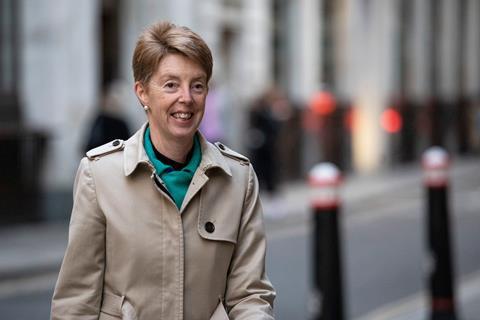
12.05pm: Inquiry sees an email Crichton sent from holiday in Croatia asking for an update on how the review was progressing.
Second Sight’s Ron Warmington suggested in jest whether she was ‘trying to get far enough away that the shockwave won’t impact’.
The inquiry then sees a communication from a media lawyer who says Crichton had asked for an opinion on whether the Post Office could obtain an injunction in relation to the Second Sight report. Crichton says she does not recall this.
12pm: Crichton is pressed on whether the Post Office was trying to limit the scope of the Second Sight review. The inquiry sees an email she wrote in 2013 on how to ‘box off’ the work of Second Sight.
She tells the inquiry she wanted to understand what issues were being examined.
Counsel Julian Blake tells her: ‘You are not asking that… you are saying how do you stop this being looked into.’
Soon after, a colleague emailed Crichton saying that there was an ‘opportunity to really contain the scope of the investigation’ and advising the Post Office to ‘take advantage of this’.
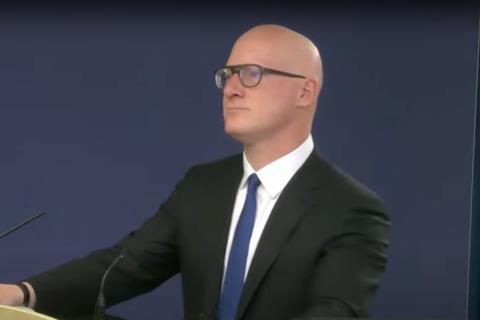
11.40am: The scope of the Second Sight review is now under the microscope, and in particular whether previous convictions should be included.
Post Office chair Alice Perkins insisted that all cases highlighted by MPs – including those where sub-postmasters were convicted – should be part of the review, irrespective of whether they were decided in court. She stressed that the Post Office should not draw a distinction and leave itself open to ‘picking cases’.
Simon Baker, a Post Office employee, then wrote to Crichton saying ‘we don’t want to be seen as reopening the cases’.
An email chain including Crichton, Perkins, company secretary Alwen Lyons and chief executive Paula Vennells is then shown to the inquiry. In it, Lyons says there is a particular issue with the investigation looking again at the prosecution of Seema Misra in 2010. Crichton had expressed the view that contacting Misra to say the cases was being reviewed would be a ‘red rag to a bull’.
Crichton tells the inquiry she was ‘too short-sighted’ and she regrets having taken this view.
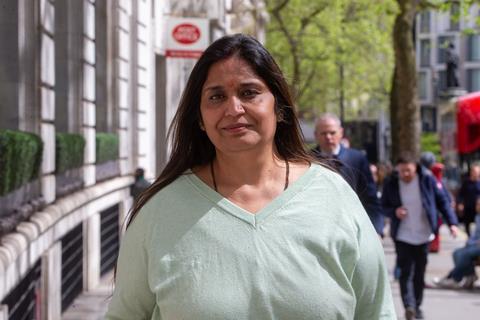
11.20am: Inquiry sees records of a strategy meeting in 2012 about who to bring in to carry out an independent review. This meeting featured Crichton, her colleague Hugh Flemington, Gavin Matthews from external firm Bond Pearce and counsel Richard Morgan KC and Daniel Margolin.
The meeting summary records that whatever the findings of the expert report it would not resolve the 'impasse' over Horizon litigation. If the report found no problems with Horizon then sub-postmasters would see this as a 'whitewash' but if it was negative this would 'open the floodgates' to damages claims by those who were imprisoned for false accounting and theft.
The summary also notes that it was 'crystal clear' that any investigation would need to be disclosed in court and would lead to appeals and stayed prosecutions. Crichton says this was the view of counsel and she wanted to proceed with an independent review by forensic accountants.
11am: In 2012, when Crichton initiated the Second Sight independent report, company secretary Alwen Lyons sent her a copy of the Post Office's internal report (the Ismay Report) from 2010 which stated there were no IT issues and no concerns about Horizon, despite complaints from some sub-postmasters. The report did however cite three cases where defendants said Horizon was to blame for shortfalls. Crichton tells the inquiry it 'fed into my view of the need to do an independent investigation'.
Blake asks if there was a 'lack of urgency' about taking action to stay prosecutions of sub-postmasters. Crichton replies: 'Absolutely. With hindsight I am sorry this took such a long time to be resolved on my watch'.
The inquiry is shown an excerpt from the Ismay Report, which said: 'It is also important to be crystal clear about any review if one were commissioned – any investigation would need to be disclosed in court… any perception that [Post Office Limited] doubts its own systems would mean that all criminal prosecutions would have to be stayed. It would also beg a question for the Court of Appeal over past prosecutions and imprisonments.'
We go to a break.
10.45am: Crichton tells the inquiry she did not agree that prosecutions should continue while the Second Sight review of Horizon is ongoing. There appears to be a lot of concern from people within the organisation at this approach. Former senior security manager Dave Pardoe emailed that a change of stance needed to be a 'carefully worded missive' stating that there was no admission of Horizon integrity issues.
Counsel Julian Blake says that in the summer of 2012 the Post Office may not have brought new cases but that for existing cases it was 'business as usual'. Crichton says she agrees with this summary. There is no evidence from the time that she disagreed with Post Office staff suggesting that prosecutions should carry on.
10.30am: Crichton initiated the Second Sight review and suggested that cases against sub-postmasters relying on Horizon data be paused while this was ongoing. The inquiry then looks at internal discussions over the case against Dorset sub-postmistress Tracey Merritt. Singh emailed Crichton in June 2012 warning that the Post Office might lose its ability to prosecute if it is not seen to promote 'effective, consistent and fair decision-making'.
He said that the decision not to prosecute Merritt could not be kept secret and that 'everybody will find out what we are doing' which would open the Post Office up to criticism and undermine faith in Horizon. Such a u-turn, he added, would be 'exploited' by sub-postmasters and 'send a green light for defendants to get hold of their member of parliament and result in copulation'.
Inquiry counsel Julian Blake helpfully suggests Singh probably meant to say 'capitulation'.
10.20am: Crichton is asked what her approach was to civil cases brought against sub-postmasters where shortfalls were found in their branch accounts. She says she would approach IT and senior executives for assurances and to 'convince me' that Horizon faults were not to blame.
'I was trying to understand that part of the Post Office process. I relied upon the information given by IT and the network team'.
10.15am: Attention turns to the now-notorious email from criminal lawyer Jarnail Singh after Misra was convicted, in which he says the outcome will be to deter the 'Horizon-bashing bandwagon'. Crichton says she does not remember receiving this, although she accepts she would have done.
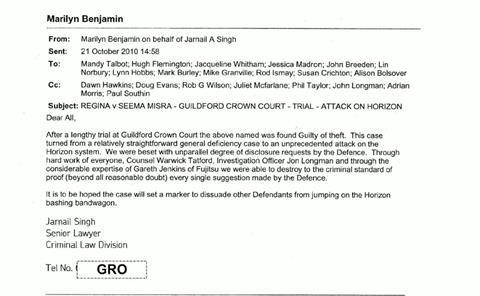
10.10am: Inquiry is shown an email from October 2010 in which Post Office lawyer Mandy Talbot (who gave evidence last year) informs Crichton and others there have been a number of allegations about Horizon from sub-postmasters accused of wrongdoing.
The email states that the Seema Misra prosecution in particular will be important and that 'if the prosecution is only partially successful then it is likely to make the civil claims [against sub-postmasters] very difficult to proceed with if we cannot rely on the Horizon data'.
9.50am: Crichton begins by turning directly to the victims present at the inquiry and making a statement: 'I am truly sorry for the suffering caused to you and your families. I wish that things had been resolved more quickly and again I am very sorry that they have not been. I am here today to give my evidence to the inquiry with the view to establishing the facts and to try and ensure that something like this never happens again.'
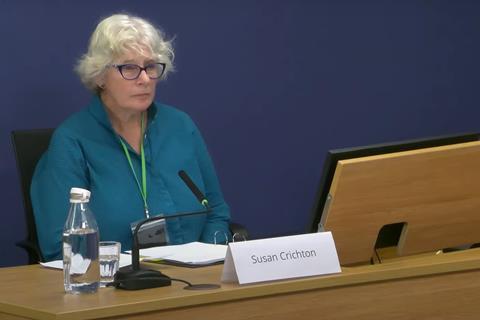
The Post Office Inquiry continues Phase Five with an appearance from one of the key legal figures involved: Susan Crichton, general counsel from 2010 to 2013. Crichton oversaw the legal department at a time when sub-postmasters continued to be convicted and suspended, but when it also started to emerge that the Horizon system may be flawed.
Crichton, portrayed in the recent ITV drama Bates v The Post Office, did bring in accountants Second Sight - who helped to uncover the Horizon failings - and left the organisation very suddenly, so her evidence will be highly instructive as to what management knew about the unfolding scandal and how they responded.























